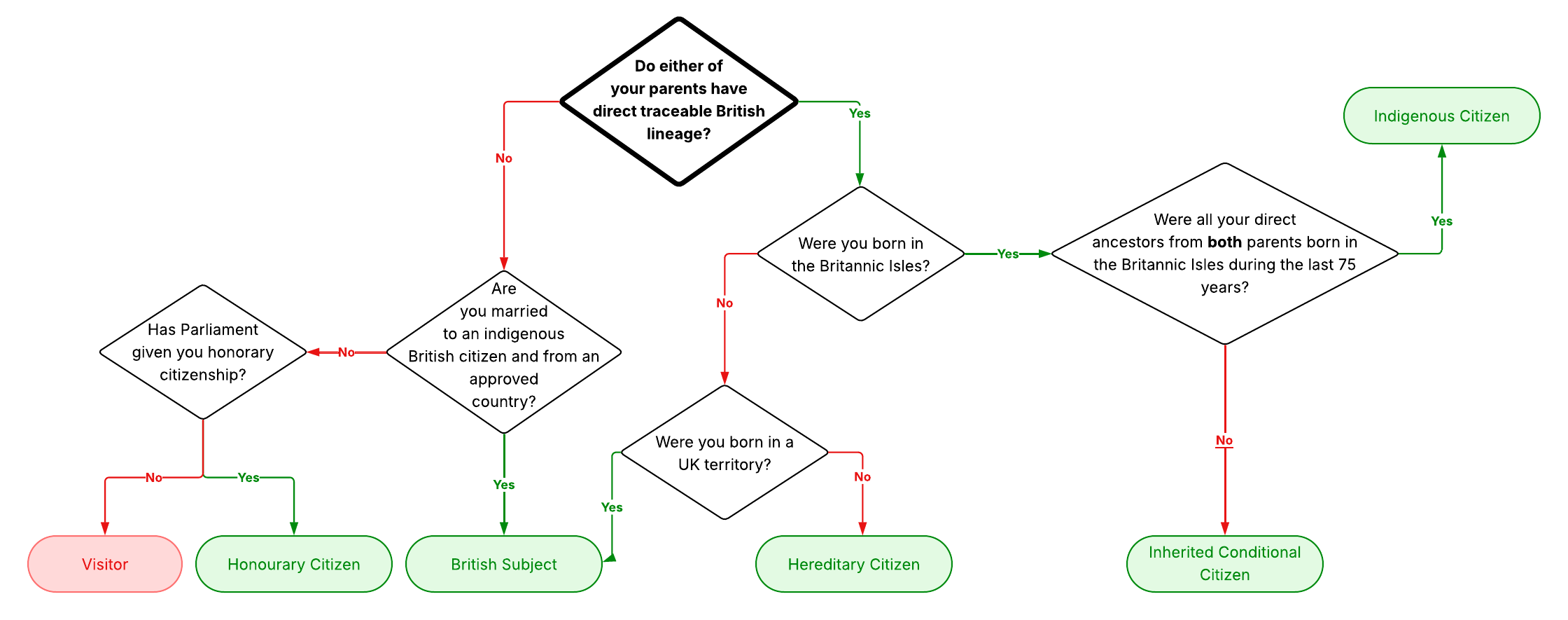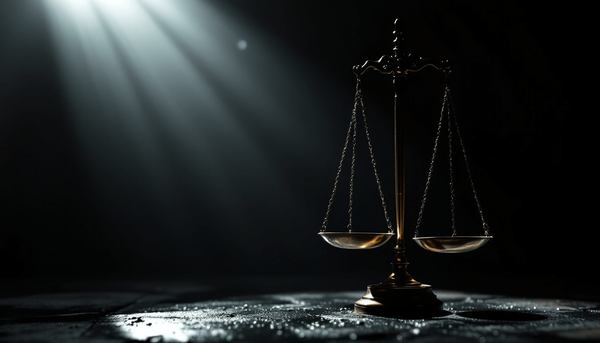The BINCA Framework: Citizen, Subject, or Visitor
Our bill integrates a research-driven 75-year rolling definition of indigeneity for the first time, and ties nationality exclusively to the events of birth, marriage, and death. A simple decision tree quickly categorises anyone, handles edge cases, and scales effortlessly for centuries ahead.

A country is defined by its people and their borders, not magic soil. Only birth, marriage, and death can change nationality status. If you remove the Scottish from Scotland, it is no longer Scotland. If you remove the Welsh from Wales or remove the Irish from Ireland, they are no longer their nations. The same is true for any country – America is what she is because she is defined by Americans, as is China or anywhere else. Without its people, a country is just a block of land.
Our four peoples are not propositional nations or abstract ideas. We are an ancient archipelago with customs, traditions, and morals which have emerged and evolved. A country is not an "idea" which has "values." This is where the Network State concept entirely fails: you cannot create a country out of a piece of land or hypotheticals.
An Englishman cannot go to China and "self-identity" as Chinese. Identity is not "asserted," it is recognised. A Frenchman cannot go to India and claim to be Indian, because the Indians there must recognise him as so. This is where the sociology nonsense of "identity" also collapses: identity is very little to do with the individual at all; it is about who he is recognised by others as, and who he himself recognises to be similar to him.
BINCA - The Basics
The British Immigration, Nationality, and Citizenship Act combines Reiners' working methodology around indigeneity with Coppen's notion of the "inherited conditional citizen." It massively simplifies everything around immigration and nationality, flattening all laws since WWII into a single framework.
You are a citizen, a subject, or a visitor. That's it. No "leave to remain," no "asylum," no abstract categories, no magic soil.
- A citizen is someone who was born in United Kingdom territory to at least one British parent.
- If all 14 direct ancestors, i.e. 2 (parents) + 4 (grandparents) + 8 (great-grandparents) were born on British soil in the previous 75 years, you are indigenous.
- If you were born on British soil, but they weren't, you are a custodian of citizenship which is inherited and conditional.
- If you were born overseas to a British citizen parent, you are hereditary (unless on diplomatic/military service, etc.)
- If Parliament voted to make you a citizen for your service, you are honourary.
- If you were born in a UK overseas territory or married a British citizen from an approved country, you are a subject.
- Anyone else is a visitor.
That's it.
Any citizenship other than indigenous is revokable under specific circumstances which become narrower the closer you approach indigeneity. These are not transferable, nor are they heritable. Indigenous status can only be inhabited with an unbroken 75-year lineage.
If you marry someone who was not born in Britain, or whose parents were not born in Britain, your child is ICBC, through you.
If you are of Jamaican descent and had a child born today, in 2025, and all 14 of your Windrush ancestors were born on British soil since 1950, they are indigenous.
If your parents arrived in 1960, they are outside the 75 year period, and you are not. If any of your direct lineage married a foreigner in that period, you are not. That child born in 2025 has inherited their citizenship and it is conditional (ICBC) until they are indigenous through a 75 year unbroken connection to the country and its people.
Visitors still require a visa to approach the border (background vetting), and may be issued permits of conditional stay for different lengths of time which are instantly revokable.
You can visit for any reason you like, with a default stamp of 30 days. You can visit for three years to study; visit to get married; visit to do business. But you are a visitor. If the Secretary of State decides you can visit for up to five years, you are still a visitor. The only thing you can do to change your nationality is marry, because birth, marriage, and death are the only events which matter in regards to nationality at all.
If you marry a British citizen during your stay, or anywhere overseas, you become a subject if they are from an approved country. If you later have a child, your spouse's parenthood makes them ICBC. Becoming a subject is instant upon proof, and prestigious: no paperwork or weirdness at the airport. You have your own beautiful jacketed passport-like document as an invited guest of His Majesty and stroll straight through the citizen lane with the right to live and work, analogous to "leave to remain" but conditional upon your marriage.
If you marry another foreigner, both of you remain visitors, as does your child – because they require a British parent, not merely a birth on the soil.
Deeper Into The Workflow
Nationality and lineage is complex. BINCA makes it instantly simple. Anyone in the UK can immediately understand their status.
Starting With Birth
The process begins with a central question: whether either parent has direct, traceable British lineage. From here, the framework branches into multiple legal pathways.
If no direct lineage exists, the bill provides three alternative bases.
Where Were You Born?
First, it checks whether Parliament has conferred honorary citizenship. If so, the person is an Honourary Citizen; if not, they are simply a Visitor.
Did You Marry?
Second, if not honorary, the framework asks whether the individual is married to any British citizen and from an approved country. If this condition is satisfied, they are deemed a British Subject.
Are You Part Of The British Family?
Third, failing that, the framework considers whether the individual was born in a UK territory. If yes, they qualify as a Hereditary Citizen; if no, they fall outside citizenship altogether under this path.
What Is Your 75-Year Lineage?
If direct parental lineage does exist, the bill next asks whether the person was born in the Britannic Isles. If not, they default to Hereditary Citizen status.
If they were, the next question concerns ancestry: whether all direct ancestors from both parents were also born in the Britannic Isles during the last seventy-five years. If this strict requirement is met, the person is recognised as an Indigenous Citizen.
If it is not fully met, they are instead classified as an Inherited Conditional Citizen, acknowledging lineage but attaching conditions to its recognition.
In essence, the draft creates a tiered system of belonging and recognition:
- At the highest level, Indigenous Citizens are those with uninterrupted local ancestry across recent generations.
- Hereditary Citizens retain recognition through lineage or territorial birth.
- Inherited Conditional Citizens reflect partial compliance with the ancestral test.
- British Subjects and Honourary Citizens enter by marriage or parliamentary grant.
- Visitors remain outside the framework entirely.
The structure reflects an emphasis on ancestry, recent generational ties, and controlled routes of entry, rather than universal jus soli or jus sanguinis principles.
How Do You Prove Your Lineage?
Easy. With 15 birth certificates, which can be digital or stored in a trusted provider's digital identity system so repetition is reduced. You need your own, your parents, your grandparents, and your great-grandparents' paperwork.
Make a blockchain if you want, or a certificate. It doesn't matter. The Act defines identity providers who must use a form of zero-knowledge proof to anonymise the customer and authorise the data. Record the lineage once, and add to it when the blessing children arrives.
The result is a reusable Status Recognition Certificate.
Britain began systematic civil registration of births, marriages, and deaths in 1837, when the General Register Office was established under the Births and Deaths Registration Act 1836. From 1 July 1837, all births in England and Wales were meant to be recorded in official registers.
Before that, records of births were not kept by the state. Instead, the main source was parish registers, maintained by the Church of England from 1538 onwards, which usually recorded baptisms rather than actual births. These were less precise, since not all baptisms took place immediately after birth, and non-Anglicans often had incomplete or separate records.
Scotland introduced statutory civil registration slightly later, in 1855, under the Registration of Births, Deaths and Marriages (Scotland) Act 1854. Ireland followed in 1864 for all births, marriages, and deaths (with non-Catholic marriages recorded earlier, from 1845).
Everyone in the UK was born after 1837.
You can get your great-grandparents' birth certificates.
Under the 75-year pattern, the current cutoff or trigger date is 1950. To qualify as indigenous, everyone in the new child's family since then must have been born in Britain to British parents, including those alive in 1950.
Gaps: HEPs, Adoption, and Stateless Children
A person eligible for Hereditary Citizenship who has not yet satisfied the requirements for full recognition is a Hereditary Eligible Person (HEP). They may reside in the United Kingdom on a provisional basis with rights equivalent to British Subjects, pending completion of assimilation requirements.
This generally means they have been born overseas but not registered with the UK consulate or lack lineage proof. If your mum or dad is British and you were brought up in Australia, you need time to prove it and get the certificates together. Your parent's status is enough for temporary provision.
When a child born in the United Kingdom to ICBC parents would otherwise be stateless, the Secretary of State is given power to grant a Temporary Conditional British Status (TCBS). TCBS confers no right of inheritance, permanent settlement, or future upgrade unless assimilation requirements are met by age 18. As an adult they can either apply for a recognised status or be reclassified as a visitor, subject to removal.
Why 75 Years?
The bill requires a rolling period so it is scalable and flexible for the future. Pinning nationality to 1948 makes it impossible to determine in 2085. 75 years is approximately three generations, or the common concept of "grandfathering." Four generations makes lineage much harder to track because the relative distance is too much of a burden to prove with birth certificates. Two generations is not enough.
This is essentially the overlap between genealogical time (how long it takes for ancestry to branch out) and sociological time (how long it takes for a family line to be socially assimilated or embedded in a host country).
Put simply, indigeneity means:
Every one of your direct ancestors for the previous three generations over the last 75 years was born on British soil to British parents. Your family has maintained a direct, unbroken connection to the Britannic lands and the Britannic peoples through continuous presence, permanent bonds of affectionate loyalty to those people, and immersion in our culture.
Moreover, this three-generational figure has scientific data behind it.
In demography and anthropology, a “generation” is often estimated at about 25 years. Three generations therefore covers around 75 years. That’s long enough for:
- grandparents to be born abroad,
- parents to be born in the new country but raised bilingually or biculturally, and:
- grandchildren to be born and raised entirely within the new society.
This model is widely used in migration studies. The “third generation” is often considered the point at which immigrant-origin populations are fully socially integrated or indistinguishable in many respects from the host population.
Empirical studies support this generational ladder of integration:
- First generation (migrants themselves) usually maintain stronger ties to the country of origin, with language, cultural, and sometimes economic differences.
- Second generation (children of migrants) are typically bilingual, bicultural, and straddle two identities. Violence and disruption happens here.
- Third generation (grandchildren of migrants) are much more likely to speak only the host country’s language fluently, marry outside their heritage group, and have weaker direct connections to ancestral homelands.
This is known as Hansen's Principle, or the “three-generation assimilation hypothesis” (associated with Milton Gordon’s Assimilation in American Life (1964)). More recent work (e.g. Richard Alba, Alejandro Portes) complicates it, but the rough pattern holds: by the third generation, most markers of immigrant distinctiveness fade.
This is why “75 years / three generations” often shows up in policy:
- It’s long enough to move from foreign-born settlers to grandchildren who are fully native-born.
- It’s short enough to trace reliably in civil records (most modern states only have systematic birth certificates from the mid-19th century onward).
- It balances biology and sociology: ancestry and assimilation.
Streamlined Travel
BINCA recognises the need for smooth trade, family visits, and frictionless borders. For that, we define several key mechanisms of trusted border entry:
- The Common Travel Area (CTA) remains in force.
- Common Trust Channel: citizens of approved anglophonic countries with cultural similarity or descent (Australia, Canada, New Zealand, United States, etc.) are given highly lenient conditions and lessened trade barriers.
- Expedited Crossing Programme: a citizen of a key ally (US, CA, AU, NZ) who has entered the UK five times over two years, and apply at a UK consulate with background checks to stay for 12 months with a 3-month absence between visits.
Jurisdictions may be added or removed from these channels if two or more of the following criteria apply:
- Majority non-Christian religion
- Non-Common Law tradition
- No UK ties pre-1945
- Homicide/violence rate ≥ 5× UK average
Visitors can be given up to 180 days in any 12 month rolling period, and they may also conduct business.
Dual Nationality & Renunciation
You may possess as many other nationalities as you like. Your status is decided entirely by where you were born and your Britannic lineage. If you become a citizen of another country, or multiple countries, it doesn't matter. What matters is whether the state recognises you as a British citizen.
However, they may not hold public office.
The existing renunciation mechanism remains unchanged. You may apply to be de-recognised, and take up your nationality once later. Should you divorce, you are no longer a subject the day your decree is finalised in court, and you become a 30-day visitor.
Revocation, Denaturalisation, Expulsion, & Deportation
BINCA doesn't merely determine categories and consolidate the good parts of previous messy immigration law. It provides clearly narrowing terms under which your status can be removed. It is a moral and legal impossibility to remove it from indigneous citizens, for obvious reasons – it's in the term itself. If you belong to the land, you cannot be expelled from it.
The Secretary of State may revoke any non-citizen status without explanation where it serves the national interest. Revocation triggers immediate removal unless otherwise stayed for up to seven days under expedited proceedings.
The Act extends the scope of immigration to the community at large. Communities may petition for the entry and status of a person to be changed through a jury process. They may nominate a candidate for inclusion or removal.
Visitors
Any visitor is removable at any time if they breach the conditions of their visit.
Subjects
A British Overseas territory individual is unaffected by removal proceeding from where they were born. A foreigner spouse ceases to be a subject otherwise upon divorce. Breaching status or criminality receiving a sentence of one year or more triggers removal.
Inherited Conditional British Citizen
ICBCs are, for all intents and purposes, ordinary British citizens. The difference is they may be denaturalised and removed on the basis of serious criminality. The prime example here is terrorism and rape gangs: if you are a Pakistani who was born in Britain to immigrant parents and you are convicted of bombing a stadium or raping a child, you will be removed and expelled on the end of your sentence, regardless of whether you are made stateless or not.
Axel Rudakubana is a case study. As a second-generation immigrant to Rwandan parents, he murdered British children. Under BINCA, he is a visitor. His criminality renders him deportable, and stateless.
Hereditary Citizen
Hereditary status generally means being born overseas to a British parent (probably as a dual national of another country), and is similar to being a subject. You can blocked from entry or removed for serious criminality. The Act specifies "high treason, terrorism, espionage, other grave threats, or serious criminal offenses as defined by statutory instrument."
Indigenous
An indigenous citizen cannot be denaturalised from the land in which they are indigenous, but they may be expelled for up to ten years in the public or national interest. After community nomination and conviction through jury trial, a court may order their temporary removal for offences which are of exceptional seriousness: repeated attempts at sedition; severe criminality, and more.





